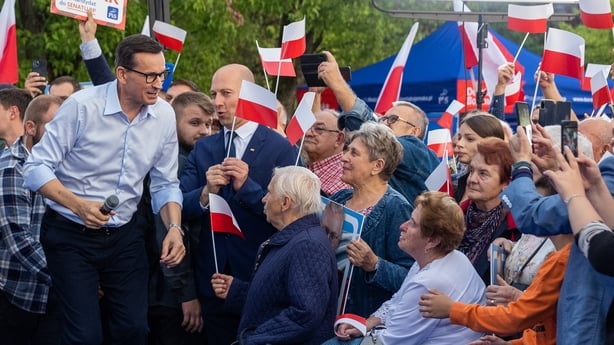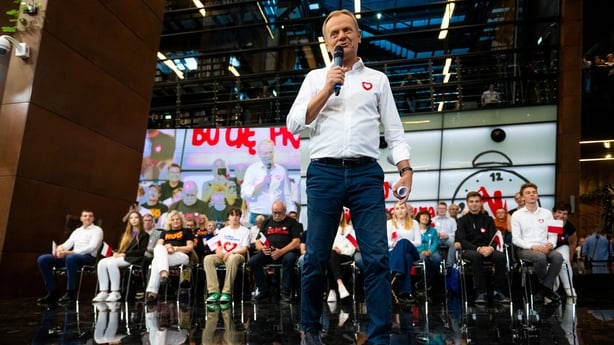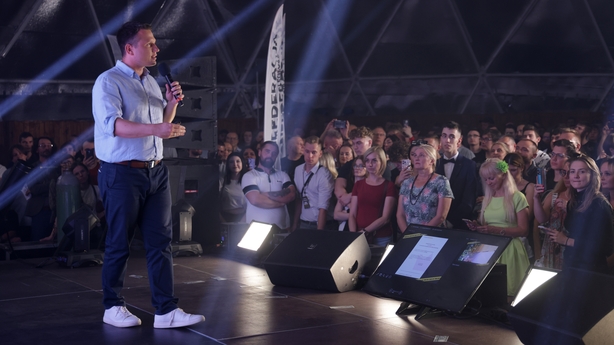Three weeks of campaigning remain ahead of Poland's elections on 15 October in what has become a bitterly contested race between the ruling right-wing Law and Justice party and the main centrist opposition, Civic Coalition.
Law and Justice remains the country's most popular party and has strengthened its lead to nine points, on 35%, ahead of Civic Coalition on 26%, according to the latest IBRiS poll on Friday.
Another pollster, United Surveys, gave Law and Justice a slimmer lead, on 31% compared with 27% for the main opposition.
This week, Prime Minister Mateusz Morawiecki's surprising comments about halting Poland's deliveries of new weapons to Ukraine grabbed headlines internationally.
However, his comments were not front page news in Poland.
Instead they fitted into an already-packed election discourse where the language used by opposing camps is often caustic.
Surveys show that the top concerns for voters are access to healthcare and inflation, followed by the war in Ukraine.
Inflation has fallen in recent months to 10% year-on-year after hovering around 16% for most of 2022.
Law and Justice has driven its campaign to focus on opposing illegal immigration and protecting national security.
Both issues have become the main talking points of the campaign.
The party currently holds a slim majority thanks to its coalition with Sovereign Poland, a smaller right-wing party.
Just over one third of Poland's population lives in small towns and rural areas.
And it is from this base that Law and Justice gains the majority of its votes and seats - the party's leadership is holding campaign rallies in many smaller Polish towns.

It explains why the party backed Polish farmers so vehemently since strikes earlier this year by their unions in opposition to Ukrainian grain imports.
And, by extension, the government's decision to introduce its own national ban on Ukrainian grain imports last week after the European Commission lifted its existing embargo.
Support for farmers, coupled with placing an emphasis on national security go a long way to explaining Mr Morawiecki's comments on cutting arms supplies to Ukraine.
No doubt they will play well with the party’s core supporters.
Some of the highlights this week included the brief arrest of an opposition MP for protesting loudly (with a megaphone) outside a Law and Justice rally and an unsuccessful attempt by Donald Tusk, former prime minister and leader of Civic Coalition, to hold a press conference outside the office of state broadcaster TVP in Warsaw.
Mr Tusk was holding the event to criticise the broadcaster's staunchly pro-government coverage.
However, a well-known TVP reporter tried to stop it, standing in front of cameras belonging to independent media and engaging in a 15-minute tirade with Mr Tusk and his party colleagues.

During the week, Law and Justice published, what it said, was a military defence plan from 2011 when Donald Tusk was prime minister.
The released documents allegedly planned for Poland's armed forces to fight a defensive action west of the Vistula river in the event of a Russian invasion, and involved ceding about a third of Polish territory in the east, until support arrived from NATO allies.
Law and Justice claimed that it is the only party that can guarantee Polish sovereignty.
On immigration, justice minister Zbigniew Ziobro spent much of the week criticising a new film, 'Green Border', by Oscar-nominated director Agnieszka Holland, which depicts the lives of Syrian refugees trying to cross into Poland from Belarus.
Mr Ziobro, who had yet to watch the film, wrote on X that it was a "Tusk/opposition weapon aimed at the Polish government".
Two smaller parties, the far-right Confederation party, supported by one in three men under 40 and polling at 9%, and the centre-right Third Way, also on 9-10%, are engaged in a fight on the sidelines to gain the support of the country's entrepreneurs.
Either party could play a role in the make-up of the next government, albeit in a confidence and supply type arrangement.
It would be logical to think that Confederation, with its anti-abortion and anti-immigration stance, would be a natural bedfellow for the socially conservative Law and Justice party. But not so.
Confederation, whose 36-year-old co-leader Slawomir Mentzen has amassed a huge following on TikTok, wants to introduce a single low rate of income tax and has spent a lot of the campaign criticising Law and Justice's high spending on social benefits, and help for Ukrainian refugees.

Poland's grouping of left-wing parties, simply 'The Left', is also on 9%.
The Left is 'too left' on economic policy for Mr Tusk's Civic Coalition, but when the votes are counted, they may become a useful ally for the centrists to counter Law and Justice.
A 4-point gap is not a disaster for Civic Coalition.
Anything wider than that and the main opposition will struggle to cobble together a broader coalition with centre-right and left groups to form a majority in the 460-seat parliament, the Sejm.
But it would be wrong to say that Law and Justice is only popular in small town Poland.
A generous child benefit scheme, on a par with those in western EU countries, introduced by the party in 2016, has gained voters in larger urban areas too.
Law and Justice has pledged to increase child benefit to 800 Polish zloty (€175) per child per month, up from €110 currently.
This has made Mr Tusk’s party, normally fiscally conservative, tack to the left on social spending proposals.
Civic Coalition has promised 100 "specific" policies, to be introduced in its first 100 days in government.
They range from tax breaks for entrepreneurs to fully funded IVF treatment for couples.

Alongside the parliamentary election on 15 October, voting will take place for the Senate, Poland’s upper house, as well as four referendum questions - all to be held on the same day.
The four referendums may prove to be the ace up the ruling party’s sleeve as they closely reflect the key points of the party’s campaign agenda.
Two of the questions deal with immigration - one of which reflects the government’s opposition to the European Union’s migrant relocation pact.
The other two deal with protecting state assets and the age of retirement, currently 60 for women and 65 for men, which Law and Justice says it does not want to raise.
Though political parties must adhere to a 32 million zloty (€6.5m) cap on campaign spending for parliamentary elections, there is no such limit on public spending for referendums.
The opposition parties, which did not want the referendums in the first place, argue that the current government is using the questions to promote its own parliamentary election agenda.
The vote on 15 October is unlikely to result in a majority for either of the big parties, but may result in either of the following scenarios.
Either - more of the same, but even more right-wing: a government that has developed a tense relationship with the EU's institutions over immigration and the rule-of-law, and is guided by Catholic doctrine on social policy at home.
Or, a broad centrist coalition which will seek to repair ties with the EU over rule-of-law changes, immigration policy, and address access to abortion.
The more liberal members of the coalition favour civil union for same-sex couples, but that remains a step too far for a conservative bloc within Mr Tusk’s own party.
Civic Coalition plans to hold a march with one million supporters in Warsaw on 1 October.
It needs a big display of public support before voting day to stand a chance of closing the gap on Law and Justice.







